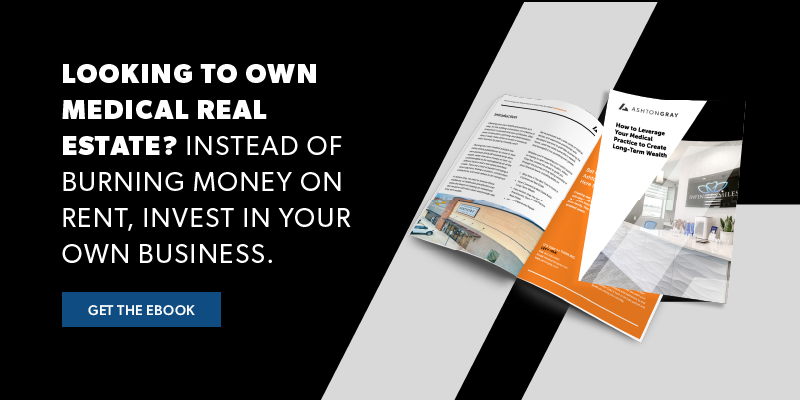
How Real Estate Creates Long-Term Wealth
In the past year, the U.S. economy has experienced a post-pandemic hangover, full of skyrocketing inflation and a struggling stock market. So it’s no surprise that many people are turning to real estate as a place to securely store their money.
According to a Gallup poll, Americans ranked real estate as the best long-term investment versus stocks, savings accounts, and gold. What makes that more striking is that survey was conducted in 2019, well before the residential real estate market boomed during the pandemic.
The ensuing lockdown was challenging for some commercial real estate sectors like office buildings, but others flourished – like medical and industrial.
Those industries continue to pick up momentum. In fact, according to the Wall Street Journal, investors set a record for U.S. commercial property sales in 2021, recording $809 billion in sales according to Real Capital Analytics, which shattered the record set in 2019.
Despite a pandemic that halted the majority of businesses, it seems like real estate is becoming more lucrative than ever. So, why does real estate continue to stand the test of time?
Timing is Everything
“People who want to wait for lower interest rates, less market volatility, or decreased construction costs often miss out on years of wealth building,” says Ashton Gray Developer, Jack Geurkink.
“The only variable holding people back from investing in real estate is short-term thinking,” adds Cole Smith, also a Developer at Ashton Gray. “Whether it be purchase prices, ROIs, interest rates, or material costs – one thing is certain: the cheapest anything has ever been is now. When you start thinking in windows of time of 10 years or greater, investing in real estate starts to make the most sense.
“With Ashton Gray, there aren’t the typical barriers to realizing your goal of investing in real estate,” explains Jenna Adkins, VP of Real Estate Operations. “While we can talk about why it’s the most lucrative investment all day, it’s better to realize it and actually participate. The most used phrase in our office is, ‘the best time to invest in real estate was 100 years ago and the next best time is right now.’
Timing the market for maximum return is pretty difficult. But when you invest for the long term, you may experience a dip here or there, but over time the value of real estate almost always trends up – even in times of high inflation.
According to the National Association of Real Estate Investment Trusts, Real Estate Investment Trusts outperform the S&P 500 in 56% of twelve-month periods with high inflation and over 80% of twelve-month periods when inflation is high and rising.
Hedges Against Inflation
So, why is real estate a good hedge against inflation?
One reason is that it can generate passive income. Renting out your owned property can cover the cost of a mortgage and then some. And as you hold onto the property for the long term, your mortgage will stay the same as the price of rent around your property likely increases.
“Passive income is one of the biggest benefits of owning commercial real estate, but a lot of people don’t know where to start,” Jenna adds. “It is important to partner with a savvy investor (like AG) that is skilled at creating proformas, analyzing rates, partnering with the right lenders, and managing your project to maximize your return on your investor. A lot of people think they can do it better, they step in and realize there are so many variables when owning property.”
Secondly, that intrinsic relationship between a fixed monthly mortgage payment and rising inflation means that you’re actually paying less and less as time goes on. A $2,000 monthly payment is a lot more costly in 2010 than it would be in 2022. Of course, this depends on the terms of your loan.
Also, taxes. Owning real estate comes with several advantageous write-offs.
“Investing in real estate provides tax advantages that no other investment in the world can give,” advises Cole.
Some of the biggest? Here are the deductions that Rocket Mortgage calls out:
- Property taxes
- Property insurance
- Mortgage interest
- Property management costs
- Maintenance and repair costs
For those interested in Ashton Gray for our experience in developing commercial real estate for the medical, veterinarian, and dental practices, here are some common write-offs for owning real estate:
- Advertising
- Office space
- Business supplies
Creating Leverage
Real estate is such a sound investment that banks are eager to provide borrower-friendly loans. There are very few investments that you can finance with less than 20% down, and affordable interest rates that are amortized over 15 to 30 years.
By borrowing from the future to invest in a business that generates income today, you’re setting yourself up for bigger gains overall.
At Ashton Gray, we’ve built a model on the idea of creating leverage.
“I’ve heard from potential clients, who are trying to balance holding onto cash while scaling and growing a business or investing in real estate to build wealth,” says Jack. “My answer to them, even in this environment, is – why not both?”
While real estate appears to be trending up, other markets may make investors and business owners cautious.
“During these times, I encourage clients to have balance,” advises Jack. “Don’t live in fear about what is coming or be reckless with growth plans. Don’t stop growing your business but be judicious about how you do it. Our model reduces risk on our partners but still allows them to grow their business and build wealth.”
Ready for a deeper conversation about beginning your venture into real estate? Request a conversation with someone from the Ashton Gray team today.
